#quasi-emotional
Text
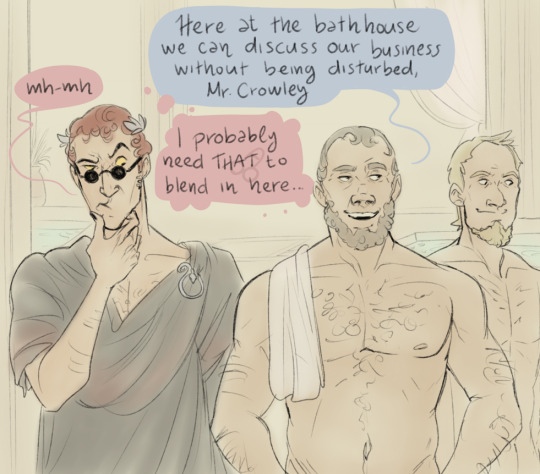
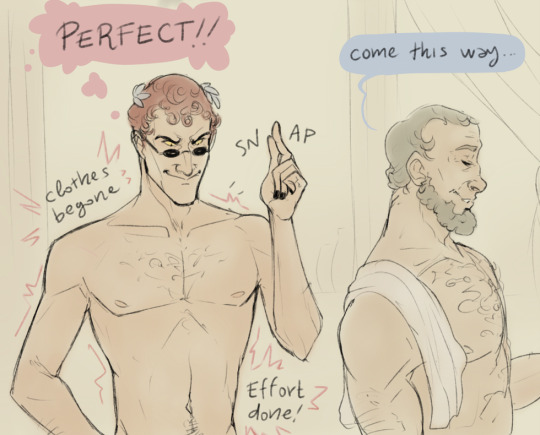
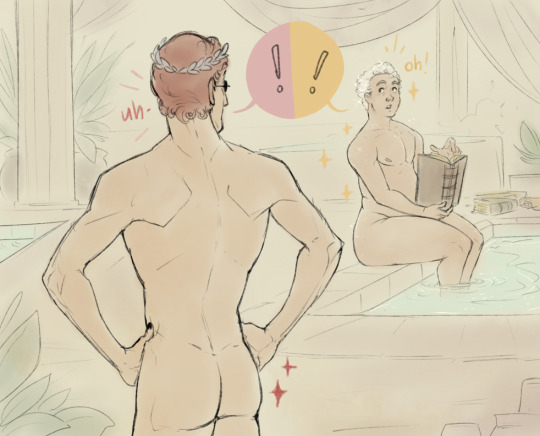
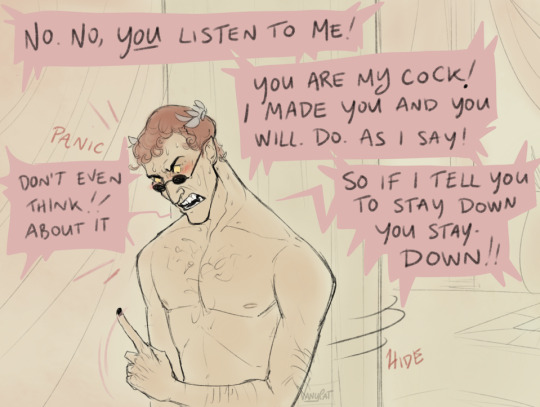
First time they make an effort (because going to the bathhouses Barbie style™ would have raised more questions than necessary...)
#good omens#crowley#Thermae and chill#aziraphale#ineffable husbands#aziracrow#Aziraphale hear's Crowley's voice and turns to him#only to see him suddenly miracle his clothes away and make an effort so he be like *surprised Pikachu*#while Crowley is like oh i always look at Aziraphale lovingly because he's the most precious bean in all existence and i love him so much#but with the new addition he is WAIT WAIT THESE EMOTIONS ARE STRONGER WAIT NO IT'S SUPPOSED TO BE A SECRET; BODY WTF!!!!#sof questo è per te e per l'headcanon delle terme - by vane#also la capigliatura greco romana è QUASI decente (by vane)#fare i tag dal telefono è ORRIBILE#wake me up wake me up inside#🤗🔥🤗#good omens comic#historical husbands
4K notes
·
View notes
Text
Well I just finished reading Notre Dame de Paris and....
yeah, I'm ruined.
#I actually got emotional as the part they were seperating Esmeralda and the recluse#Frollo I love you hut you kinda deserved it#Poor Quasi#Poor Esmeralda#Poor Everyone except for Phoebus he can go to hell#And fucking Pierre.... I just I'm glad he's alive but wtf#Rmf speaks#text#notre dame de paris#the hunchback of Notre Dame#victor hugo
60 notes
·
View notes
Text
"[Alice Perrers] requested that she be buried in the parish church of Upminster, St Laurence, before the altar of the Virgin Mary. Alice seems to have had an affinity with Mary through her life; a seal of hers from c. 1374 shows an image of the Virgin Mary and child, her tabernacle seized in 1377 had an image of the Virgin Mary on it, and now she wished to be buried before Mary’s altar."
-Gemma Hollman, "The Queen and the Mistress: The Women of Edward III"
#historicwomendaily#alice perrers#my post#I didn't know about this but it's so very intriguing#I wonder if Alice associated herself with Mary to try and assert her own 'quasi-queenship'#(ie: the most powerful woman in the country at the side of a king)#as Mary was obviously important element of queenly iconography in late medieval England#though on the flip side I suspect it would have also raised hackles that Alice - a commoner and royal mistress - was attempting#to present herself in such a way#it's especially interesting to consider in the context of Tompkins' argument that Alice was perceived as 'inverting queenship' (slay)#also this book was ... complicated.#It's very understanding and sympathetic and raised some very good points#but also tried to...massively soften Alice's actions and downplay her role and power in the process#(ie: defending her by diminishing her)#also there's this gem:#'Edward had been markedly restrained with the gifts and favour he had bestowed upon Alice' girl that is a flat-out lie#no other royal mistress of medieval England was ever given so much or honored in such a way.#yes we should emphasize Alice's own proactive role and intelligence in building up her vast estates#but even if that hypothetically hadn't happened#Edward's grants and gifts would have still made her extremely wealthy and powerful regardless#and was also weirdly obsessed with romanticizing Edward III and it got kinda questionable#like yes obviously I think we should ascribe more nuanced motivations and emotions to *Alice* than 'ambitious gold-digger#taking advantage of an aging king'#but I'm not fond of it veering too far on the other side either#I think sometimes we should simply be comfortable admitting when we simply don't know something
13 notes
·
View notes
Text
Also, while I dislike it when people ship Kara with Jason, her time as supergirl did briefly overlap with his time as robin pre-crisis and I think it would have been very funny is she found him miles more bearable than Robin!Dick.
#I'm a firm kara and dick should hate each other truther. because it's funny#but also her becoming like a quasi-big sister to jason could have been cute imo#also the emotional drama if she had survived coie and seen his red hood arc...#kara zor el#jason todd
10 notes
·
View notes
Text
listened to the too fast for love album in the car yesterday while running errands. and man. the crüe's early sound really reminds me of the first couple songs of Crystal Steel. makes me feel all emotional. to see the beginnings of a local band so similar to the crüe. getting to support them, getting to be at the gigs I can afford to get to, chat and rock out with them. brb I might actually cry ✌
#like that's my emotional support band. the band who quasi adopted me. dare i say... my friends????? IDK MAN#i just feel a bunch of emotions and i cannot word
2 notes
·
View notes
Text
bitches be like “omg you have to watch this piece of media it has such good female characters” and then it’s the 10000th story about how much it Fucking Sucks to be a woman sometimes
#Quasi vent post#sorry this is a film student moment#And there’s nothing wrong with these stories in a vacuum#I’m just getting really tired of the female experience being boiled down to pain and suffering#“Hell is a teenage girl” shut up shut UUUPPPP#being a woman is awesome sometimes! Being a woman is cool!!!!#I want female characters who are goofy and silly and cringe!!!#I want female characters who are emotional and not treated like an insane person or a monster!!!#I want stories starring women that are just women having a good time!!!#Like fuck give me more stuff like keep your hands off eizoken#or like bottoms!!!#at least Barbie had a good sense of humor about it!!!#idk being a woman sucks sometimes sure but#I’m tired of it defining my life man#also obligatory TERFS don’t interact this post isn’t for you#please educate yourselves#Sophi rambles
8 notes
·
View notes
Text
one of my personal goals, ive decided, is to try and make a system oc (ocs, technically), just to see if i can do it well
#already failed with hazel a bit bc like? hello? wheres the rest of u?#like Ooh Maybe She's Plural okay then. figure out who else is there in the system and flesh them out u dummy#figure out what happened to them.#anyway most of hazel's information is quasi-canon anyway#so if i cant figure out how to develop this idea further then ill just drop it ig#also going back to the og topic i think it would be fun to see how id be able to play the characters? so much to keep track of tho!#with all of them having their own viewpoints and emotions and feelings about the rest of the system as well as the people outside of it!#anwya#i just want to see if its something i can do#ive always found it an interesting topic#eric finally speaks
2 notes
·
View notes
Text
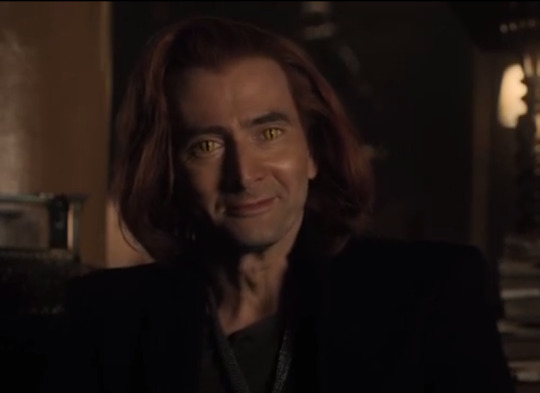
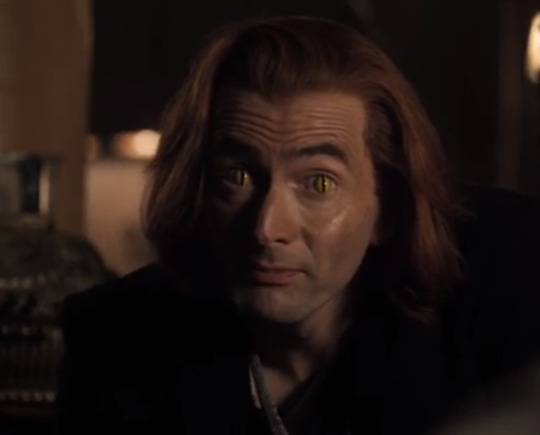
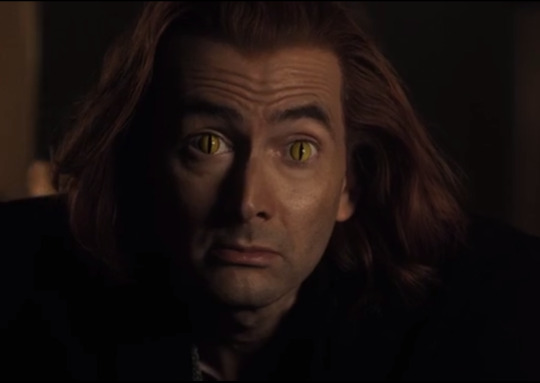
[images id: three screencaps of crowley from good omens, sitting in the bookshop trying to convince aziraphale to help him raise the antichrist. he has long hair and is without his glasses. in the first photo he is smiling genially, in the second and third he is staring at aziraphale expectantly with wide eyes, leaning forward. end id]
i gotta say aziraphale is so fucking strong for resisting crowley's appeals for help with the antichrist even for a little bit because if i had had THIS face leaning in close, looking at me in that appealing way, swaying slightly from side to side in a subconsciously hypnotic fashion, soft-looking hair perfectly framing his wide soul-probing eyes and serpentine smile? dude there would've been no argument from me about ANYTHING. this man-shaped creature could've complained languidly that he was chilly in that smooth calculating voice and i would've been like oh no that won't do at all ma'am let me pop down to seven-eleven and douse myself in gasoline so you can warm up by the flames of my burning corpse and while i'm there do you want anything? i'm so so fucking normal about men
#not tagging this. you find this while scrolling my blog or your dash or you never see it at all. it's fine to reblog though lol#not h/rny on main perse but absolutely down bad in a strange quasi-romantic mental and emotional way#mr tennant sir WHY. why do you look the way you do. who fucking gave you the RIGHT.#anyway i didn't bother with individual ids because they're all basically the same and it would've felt redundant describing them all#hope the bulk id's okay!
5 notes
·
View notes
Note
Tell me about Quasi and his relationship with Jerrie and Teazer, please!! (And maybe jerrie's gf too but only if you want to lol)
YES QUASI AND THE CHAOS TWINS AND JUBILEE!!!!!
so Mungojerrie and Rumpleteazer were the ones who took Quasi under their wing when he first joined the henchcats!!!
they're the reason his name was "Slip", during the first few weeks he would often manage to get away from them, and they said he was a "slippery little thing", and it just got shortened to Slip!!
like it was the three of them for SO long, and Quasi adored having his two best friends with him
he was heartbroken when they left, and that was the main cause of his resentment towards the Jellicles. Not because of anything Macavity had said, but because they had taken his best friends from him
but also them leaving is what forced him to start reconsidering Macavity's stance on certain things and became the push he needed to leave!!
when they reunite???? it's so emotional???? and Quasi explains why it hurt so much, and Jerrie and Teazer completely understand, because it broke their hearts to leave their best friend behind too 😭😭😭
Jerrie is literally over the MOON that Jubilee and Quasi get along so well!!!
like Jubilee is the one other cat outside of the twins, Antoinette, Jitterbug, and Quill that Quasi feels fully comfortable relaxing around!
Jubilee's definitely the cat Quasi goes to when he starts feeling a little insecure about his place amongst the Jellicles
she's also the one who encourages him to finally sit down and talk to Munkustrap and Tugger
Munkustrap ofc trusts his niece's opinion so much, and Tugger adores his daughter and knows she doesn't trust easily, so they both know that Quasi is okay and trustworthy and can be welcomed into the Junkyard, but they wait for him to approach them
when Munkustrap and Demeter adopt Quasi, Jitterbug, and Quill, Jubilee is SO excited because now they're officially family!!! they're cousins!!!
#quasi the henchcat#mungojerrie#rumpleteazer#jubilee the library cat#cats the musical#munkustrap#rum tum tugger#demeter#also i have so many emotions abt munk and dem's relationship with quasi
4 notes
·
View notes
Text
when you have perfect pitch and someone asks you what key is that song in

#musician memes#heheh#acquired quasi perfect pitch i'll concede#but when i tune my guitar properly i can learn the scale / key of a typical song in 5-10 seconds usually#or at least narrow it down to 3 candidates if it's melodically minimal and jam hard and explore which of those 3 sound best next#but i know the angular geometry and emotional geography of every scale like the back of my hand#except a sharp minor#lol#we all have weaknesses#you can play exactly zero open strings with a sharp minor in standard tuning#making a sharp minor the hardest maybe to play on a guitar without a capo at least#nah but a sharp minor sounds saccharine and incredible after any song in the hyper-popular key of a minor
0 notes
Text
being intentionally vague about my own writing but it's cool that a character I originally created for some Fun, Light Sci-Fi Adventures when I was 20 now has so much lore that talking about her feels like cracking open a reference text about as thick as The Lord of the Rings trilogy--and it all just happened! it just happened because she turned back up in my mind and she developed an honest-to-god life of her own! I love it!
#oc talk#text#kelsey rambles#odessa#like we have a pocket version of her timeline where she winds up on a ships of other quasi-immortals going on adventures together#it's not her main timeline but i love how many different directions her story has a chance of taking now! it's cool!#she matters so much in her story when she thought she'd never matter to anyone ever again! i get emotional about it!
0 notes
Text
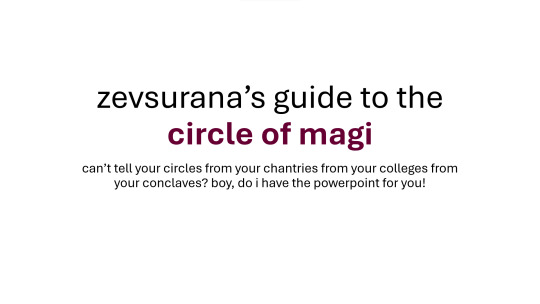
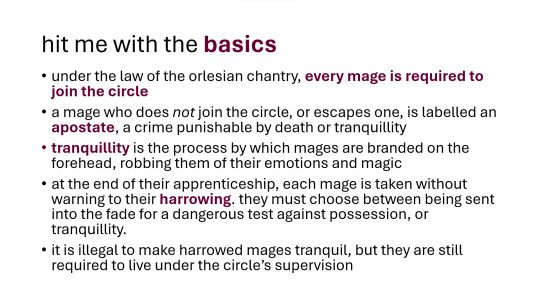
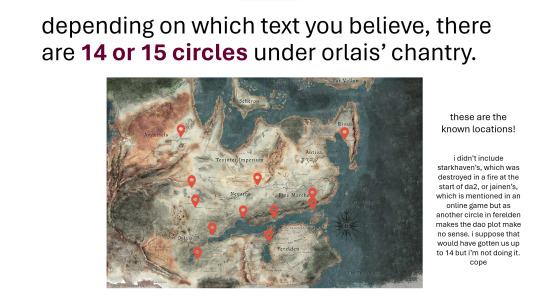
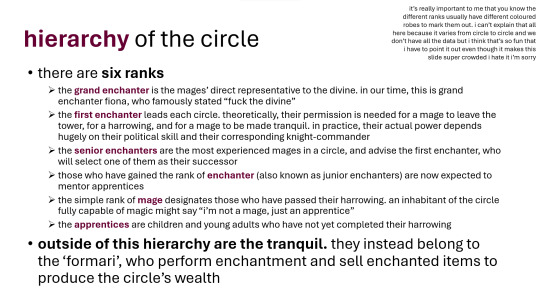
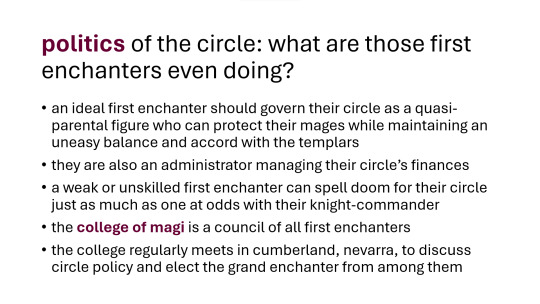


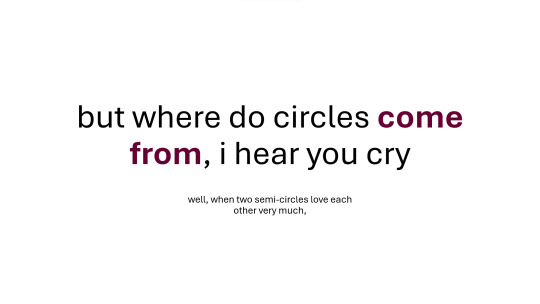
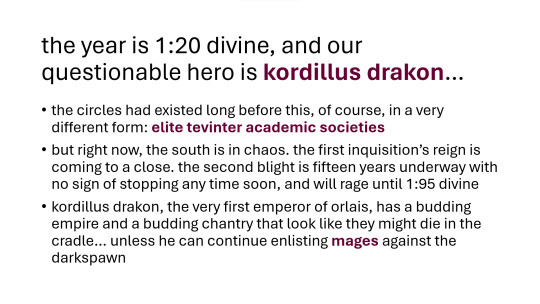
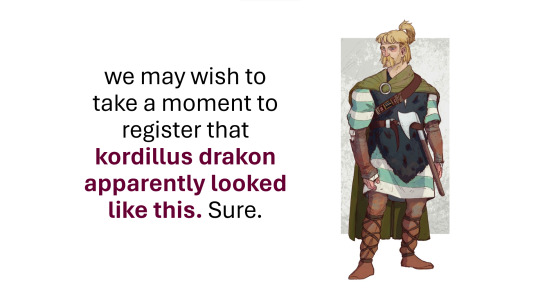
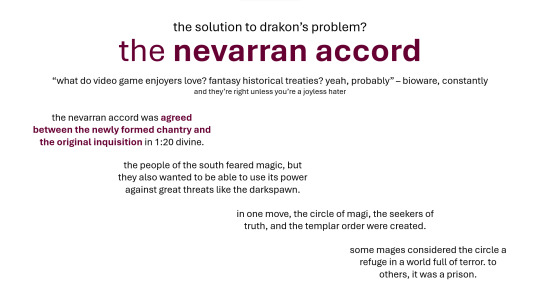
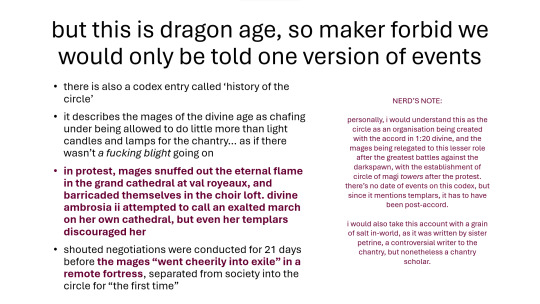
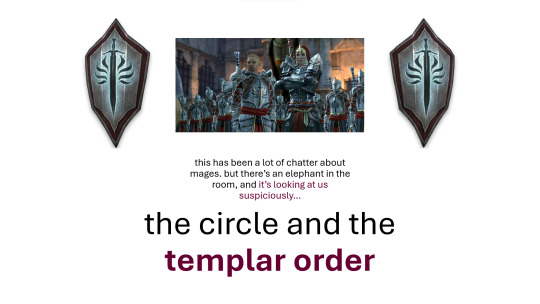
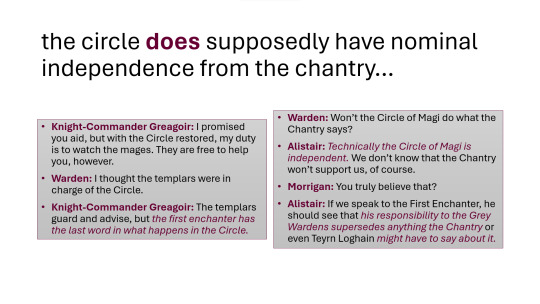
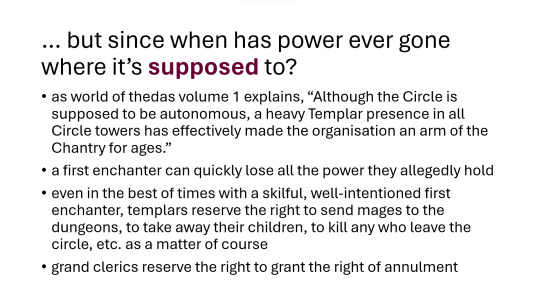

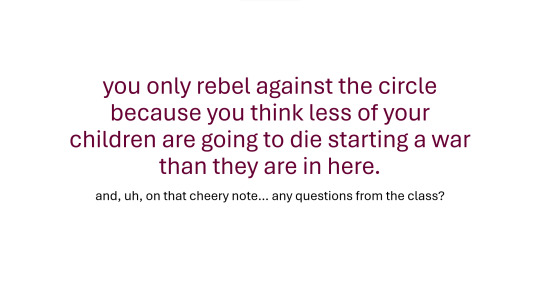
back and even bulkier with another powerpoint! i opted for spreading the information out in a hopefully engaging way over limiting the number of slides. the circle is a BIG, big topic, with such focus over the course of the games, so if i didn't cover anything useful, you want to know anything more specific, or equally if i made a mistake and missed or misinterpreted something, please let me know ily!!
transcript below the cut! my eternal thanks to @bisexualcommandershepard for providing one for the previous powerpoint and in doing so reminding me to get my act together, you have my sword
zevsurana’s guide to the circle of magi
can’t tell your circles from your chantries from your colleges from your conclaves? boy, do i have the powerpoint for you!
hit me with the basics
under the law of the orlesian chantry, every mage is required to join the circle
a mage who does not join the circle, or escapes one, is labelled an apostate, a crime punishable by death or tranquillity
tranquillity is the process by which mages are branded on the forehead, robbing them of their emotions and magic
at the end of their apprenticeship, each mage is taken without warning to their harrowing. they must choose between being sent into the fade for a dangerous test against possession, or tranquillity.
it is illegal to make harrowed mages tranquil, but they are still required to live under the circle’s supervision
depending on which text you believe, there are 14 or 15 circles under orlais’ chantry.
[this slide is accompanied by an image of a map of thedas. there are small markers spread across the map on 12 locations, mostly in orlais and the free marches, but included everywhere except tevinter and seheron.]
these are the known locations!
i didn’t include starkhaven’s, which was destroyed in a fire at the start of da2, or jainen’s, which is mentioned in an online game but as another circle in ferelden makes the dao plot make no sense. i suppose that would have gotten us up to 14 but i’m not doing it. cope
hierarchy of the circle
there are six ranks:
the grand enchanter is the mages’ direct representative to the divine. in our time, this is grand enchanter fiona, who famously stated “fuck the divine”
the first enchanter leads each circle. theoretically, their permission is needed for a mage to leave the tower, for a harrowing, and for a mage to be made tranquil. in practice, their actual power depends hugely on their political skill and their corresponding knight-commander
the senior enchanters are the most experienced mages in a circle, and advise the first enchanter, who will select one of them as their successor
those who have gained the rank of enchanter (also known as junior enchanters) are now expected to mentor apprentices
the simple rank of mage designates those who have passed their harrowing. an inhabitant of the circle fully capable of magic might say “i’m not a mage, just an apprentice”
the apprentices are children and young adults who have not yet completed their harrowing
outside of this hierarchy are the tranquil. they instead belong to the ‘formari’, who perform enchantment and sell enchanted items to produce the circle’s wealth
(it’s really important to me that you know the different ranks usually have different coloured robes to mark them out. i can’t explain that all here because it varies from circle to circle and we don’t have all the data but i think that’s so fun that i have to point it out even though it makes this slide super crowded i hate it i’m sorry)
politics of the circle: what are those first enchanters even doing?
an ideal first enchanter should govern their circle as a quasi-parental figure who can protect their mages while maintaining an uneasy balance and accord with the templars
they are also an administrator managing their circle’s finances
a weak or unskilled first enchanter can spell doom for their circle just as much as one at odds with their knight-commander
the college of magi is a council of all first enchanters
the college regularly meets in cumberland, nevarra, to discuss circle policy and elect the grand enchanter from among them
politics of the circle: what’s this about frat boys?
once a mage achieves the rank of enchanter, they may join a political fraternity
choose your fighter:
the largest fraternity, the aequitarians, are centrists
the loyalists are chantry bootlickers
the libertarians seek greater power and independence for the circle. the resolutionists are an even more radical group that emerged from them
the isolationists wish mages to withdraw from society completely
the lucrosians prioritise the accumulation of wealth and influence
the aequitarians maintained an alliance with the loyalists until the final vote to rebel, when wynne’s son rhys, asked to represent the aequitarians by first enchanter irving, voted with the libertarians
that was a lot of politics.
let’s take a breather because we haven’t even gotten to history yet oh boy
[this slide is accompanied by two pieces of dragon age concept art of white-haired mage women casting spells. one is an older human white woman who may be wynne, dressed in ornate robes and casting purple magic with a casually imperious gesture. the other is the concept art for warden surana, an angry-looking young elven white woman with a palm full of icy magic.]
hot circle mage concept art break. of course you have white hair and [caps lock begins] one thousand points lightning damage-- [caps lock ends]
but where do circles come from, i hear you cry
well, when two semi-circles love each other very much,
the year is 1:20 divine, and our questionable hero is kordillus drakon…
the circles had existed long before this, of course, in a very different form: elite tevinter academic societies
but right now, the south is in chaos. the first inquisition’s reign is coming to a close. the second blight is fifteen years underway with no sign of stopping any time soon, and will rage until 1:95 divine
kordillus drakon, the very first emperor of orlais, has a budding empire and a budding chantry that look like they might die in the cradle… unless he can continue enlisting mages against the darkspawn
we may wish to take a moment to register that kordillus drakon apparently looked like this. Sure.
[this slide is accompanied by concept art of kordillus drakon. he is blond white man in vaguely iron age dress, with an interesting hair cut including bangs, a high half ponytail and a very large moustache. he wears a swamp-green cloak and a black fur pelt over a green and white striped tunic, with a hand-axe slung through his belt, and crossed garters over whatever combination boots and pants he's wearing, which seems to be one singular garment.]
the solution to drakon's problem?
the nevarran accord
“what do video game enjoyers love? fantasy historical treaties? yeah, probably” – bioware, constantly
and they’re right unless you’re a joyless hater
the nevarran accord was agreed between the newly formed chantry and the original inquisition in 1:20 divine
the people of the south feared magic, but they also wanted to be able to use its power against great threats like the darkspawn
in one move, the circle of magi, the seekers of truth, and the templar order were created
some mages considered the circle a refuge in a world full of terror. to others, it was a prison
but this is dragon age, so maker forbid we would only be told one version of events
there is also a codex entry called ‘history of the circle’
it describes the mages of the divine age as chafing under being allowed to do little more than light candles and lamps for the chantry… as if there wasn’t a fucking blight going on
in protest, mages snuffed out the eternal flame in the grand cathedral at val royeaux, and barricaded themselves in the choir loft. divine ambrosia ii attempted to call an exalted march on her own cathedral, but even her templars discouraged her
shouted negotiations were conducted for 21 days before the mages “went cheerily into exile” in a remote fortress, separated from society into the circle for “the first time”
nerd's note:
personally, i would understand this as the circle as an organisation being created with the accord in 1:20 divine, and the mages being relegated to this lesser role after the greatest battles against the darkspawn, with the establishment of circle of magi towers after the protest. there’s no date of events on this codex, but since it mentions templars, it has to have been post-accord.
i would also take this account with a grain of salt in-world, as it was written by sister petrine, a controversial writer to the chantry, but nonetheless a chantry scholar.
this has been a lot of chatter about mages. but there’s an elephant in the room, and it’s looking at us suspiciously…
the circle and the templar order
the circle does supposedly have nominal independence from the chantry…
Knight-Commander Greagoir: I promised you aid, but with the Circle restored, my duty is to watch the mages. They are free to help you, however.
Warden: I thought the templars were in charge of the Circle.
Knight-Commander Greagoir: The templars guard and advise, but the first enchanter has the last word in what happens in the Circle.
...
Warden: Won’t the Circle of Magi do what the Chantry says?
Alistair: Technically the Circle of Magi is independent. We don’t know that the Chantry won’t support us, of course.
Morrigan: You truly believe that?
Alistair: If we speak to the First Enchanter, he should see that his responsibility to the Grey Wardens supersedes anything the Chantry or even Teyrn Loghain might have to say about it.
… but since when has power ever gone where it’s supposed to?
as world of thedas volume 1 explains, “Although the Circle is supposed to be autonomous, a heavy Templar presence in all Circle towers has effectively made the organisation an arm of the Chantry for ages.”
a first enchanter can quickly lose all the power they allegedly hold
even in the best of times with a skilful, well-intentioned first enchanter, templars reserve the right to send mages to the dungeons, to take away their children, to kill any who leave the circle, etc. as a matter of course
grand clerics reserve the right to grant the right of annulment
generally, the system is maintained by a mutual interest in avoiding open conflict
the templars are the ones in power with the chantry’s full support. if they drive the mages to open conflict, their comfortable routine is uprooted
templars are equipped to hunt down individual mages, even blood mages and abominations
templars are not equipped to be outnumbered or face even numbers. mages are simply far more powerful in a fair fight than they are. lyrium can only do so much
...
mages, meanwhile, operate under the not entirely unfounded belief that the outside world is entirely hostile to them
at least if they remain, they can keep an uneasy balance in which most mages survive, their existence tolerated by the chantry. they can continue studying among their own kind in the only home they know
if they openly rebel, they may throw aside what limited protections and goodwill they have. mages like wynne outright state certainty that if they rebel, “genocide” will follow
furthermore, those mages with more status have more access to privilege. they’re also the ones who have best passed the chantry’s tests. thus, those in a position to lead are least inclined to rebel
you only rebel against the circle because you think less of your children are going to die starting a war than they are in here.
and, uh, on that cheery note… any questions from the class?
714 notes
·
View notes
Text
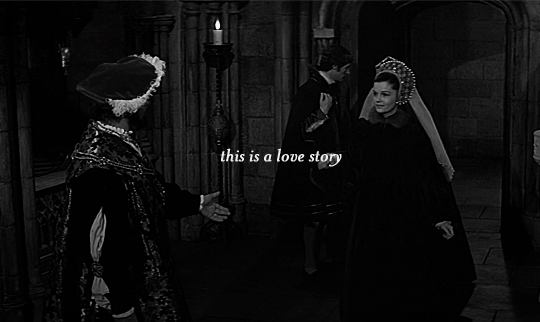
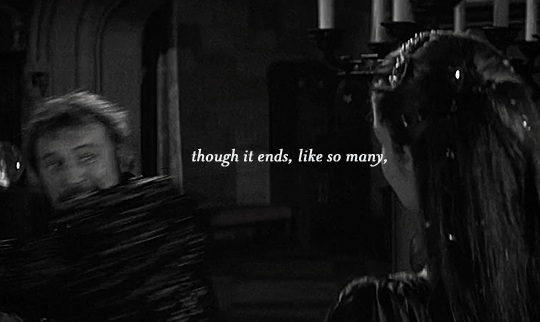
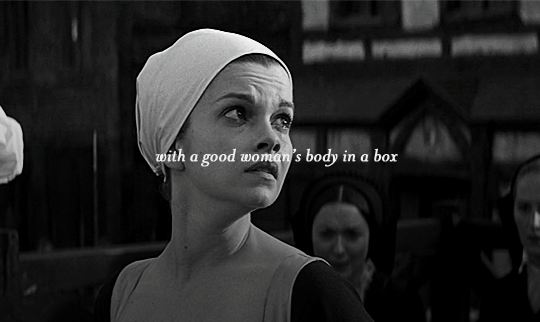
- Anne Boleyn's Sleeve by Juliana Gray, "The End"
However understandable the impulse to universalise Anne Boleyn’s story might be, these attempts mostly fail to account for the very historic specificity of her narrative. How can we account for a woman who apparently had so much sexual and emotional appeal she had the power to cleave King and country from the control of the Catholic Church, yet whose downfall was so complete she became the first English queen consort to face the executioner?
The story of Anne Boleyn is about dissenting from and challenging the dominant cultural norms; her example is that of the woman who created herself and, for a brief time, through her brilliance and her beauty and her will, maintained herself in a society in which quasi-independent female empowerment and agency were relatively unknown. She continues to speak to us as an avatar of feminine power.
- Stephanie Russo, The Afterlife of Anne Boleyn: Representations of Anne Boleyn in Fiction and on the Screen
#i start preparing for may in january 💅🏻#historicwomendaily#historyedit#anneboleynedit#anne boleyn#anne of the thousand days#genevieve bujold#history#*
278 notes
·
View notes
Note
I understand what people mean by prison abolition, but what does it mean in practice to abolish the family? I've never quite got it - who is raising children? How does it work? I'm asking in good faith, I've just always been a bit embarrassed to ask anyone
Like positions that are “anti-work” or against “gender,” the thing being objected to is more detailed and specific than the range of meanings that can reasonably or semi-reasonably be assigned to the word in question (“work,” “gender,” “family”)—which is why these propositions and programmes can have a bit of a PR problem. And, as with all terms that position themselves against something (e.g. "anti-psychiatry"), the term "family abolition" can be taken up by people with a range of different positions who disagree amongst themselves on some issues. In general, though, no one objects to "people living together or being emotionally close to each other" or "children not being left to roam about at random and get eaten by wolves" or anything.
Rather, anti-capitalist objections to "the family" tend to hinge on objections to:
parental rights, or "the special legal powers of parents to control major aspects of their children’s lives," which function as "quasi-property interests" more than anything that is in the best interest of children (link explicitly relates to U.S. law). Parents legally control where their children live, whether and where they go to school, what information they have access to, what level of freedom of mobility they have, what medical care they receive and don't receive, and what they may do with their own bodies, and are legally allowed to physically assault their children.
relatedly, the lack of legal autonomy that children possess (this is also often discussed under the banner of "children's rights" or objections to "adultism").
the positioning of "the family" as the only economic or social "safety net" in an economy and a society which provide no other one (creating an artificial "structural scarcity" of care). In a society which is otherwise dominated by "economic competition between atomized individuals," the family must be relied on—and yet, for some people (whose families cannot or will not provide living space or financial support in an emergency; whose families are abusive and physically or psychically dangerous to be around or rely on; who will not receive help or emotional support from a spouse or family unit without making serious concessions on the level of their personhood being basically respected; Black working-class people in whose communities the nuclear family unit has been deliberately prevented from forming by government intervention), the family cannot be relied on.
the way that the positioning of "the family" as the only safety net therefore constitutes economic coercion that works to keep people (especially women and LGBT, disabled and/or transracially adopted people) in abusive or exploitative situations, and that works to create incentives for working-class women (whose employment is generally less secure) to make themselves erotically desirable to men & disincentives for doing anything else.
the idea that housework, gestational labour & childbirth, and childcare are tasks "naturally" falling to the "mother" ("mother" as a "natural category"), such that the social, political, and economic nature of these tasks, and the economic and political discourses that mobilise the creation of our concept of "motherhood," are obscured.
Thus the objection is to "the family" as a unit of social reproduction under capitalism—as a legal, political entity that structures inheritance, taxes, health insurance, "race" and ethnicity, &c., and therefore works as a sort of interface between the capitalist state and the individual.
So the programme of "family abolition" involves, firstly, the control of the means of production on the part of the proletariat (this is a communist programme—the point isn't to remove the safety net of the family while keeping capitalism in place, but rather the idea is that without capitalism this ultimately abusive safety net ought not to be needed); and then the abolition of marriage as a legal institution; the abolition of parental rights; the putting in place of measures for the elderly and disabled to be cared for regardless of whether they have family alive who are both able and willing to care for them; the forming of social networks at will; and, depending on who you ask, the communal raising of children (which involves ceasing to privilege "parent" as a legal title automatically conferred upon biologically creating a child).
Obviously, toddlers who do not yet understand things about the world including "causation" and "mortality" will need on occasion to be restrained from running blithely into the jaws of wolves &c. The argument is just that coercion of this sort should be legitimately in the best interests of the child; not performed by two people who need answer for their actions, up to and including battery of their children, in no way other than saying that they "plausibly believe this to be necessary to control, train or educate their child"; and walked back in measure as the child gains the ability to assert their own desires.
Probably no one has a perfect solution 100% worked out—life is messy, and we don't know what the future will look like—but having a perfect solution 100% worked out should not be a prerequisite for noticing that the current situation is abusive and untenable.
1K notes
·
View notes
Text
Landscape helps capture the forms in which nations and movements literally and figuratively 'construct' or 'produce' nature, engineering its appearance and infusing it with significations—rendering landscape a 'cultural practice' rather than a given fact. Here landscape is both an object of investigation and a site of intervention; the very medium within which power and resistance are represented and conducted. Put differently, landscape is far from a neutral backdrop but is rather activated, serving as the medium of violence. Dispossession, deforestation, planting, land-grabbing, and acquisitions, privatization, re-modeling, clearance, or the destruction of infrastructures of life, including food sources, buildings, or supplies, all mobilize the landscape in their domination.
Representations of Middle Eastern and North African landscapes nearly invariably include desolate scenes of endless empty and parched deserts, decorated perhaps with an isolated string of camels, or a beach with large mounds of golden sand, a minaret, or an oil tower in the background. The temporality and general impression of these landscapes is slow, hazy, and dizzying, as if they are waiting for 'activation' by someone or something outside of it. Whether reproduced in academic scholarship, literature, film, tourist advertisements, or news media, these imagined colonial representations of the region's landscape place the environment centrally within them, projecting an understanding of the Middle East and North Africa as marginal, on the edge of ecological viability or as a degraded landscape facing imminent disaster due to human inaction. With this, an environmental imaginary enabled storytelling that pushed forward imperial interests in the name of 'development' and, later, of environmental 'sustainability' and 'protection.' In the case of the constructed 'Middle East,' as Diana K. Davis explains,
"Deforestation narratives have been particularly strong in the Levant region since the nineteenth century, where some of the most emotional accounts of forest destruction have hinged on the presumed widespread destruction of the Lebanese cedar forests illustrated in the cover image by Louis-François Cassas. Similar narratives of overgrazing and desertification were used during the British Mandate in Palestine to justify forestry policies as well as laws aimed at controlling nomads, such as the 1942 Bedouin control ordinance, in the name of curbing overgrazing. Such environmental imaginaries, once constructed, can be extremely tenacious and have surprisingly widespread effects."
In Palestine, the construction of an 'Israeli landscape' to redeem the purported damage done to the land by its indigenous population commenced with the first Zionist settlers in the nineteenth century and intensified with the establishment of the State of Israel in 1948. Reflected in former Prime Minister David Ben Gurion's 1951 public address to the newly formed Israeli Knesset (Parliament):
"We must wrap all the mountains of the country and their slopes in trees, all the hills and stony lands that will not succeed in agriculture, the dunes of the coastal valley, the dry lands of the Negev to the east and south of Baer Sheva, that is to say all of the land of Edom and the Arava until Eilat. We must also plant for security reasons, along all the borders, along all the roads, routes, and paths, around public and military buildings and facilities [ . . . ] We will not be faithful to one of the two central goals of the state—making the wilderness bloom—if we make do with only the needs of the hour [ . . . ] We are a state at the beginning of repairing the corruption of generations, corruption which was done to the nation and corruption which was done to the land."
This 'Israeli landscape' was largely cultivated through the multifaceted and by now well-documented eco-colonial practices of the quasi-governmental Israeli organization, Keren Kayemet L'Yisrael, the Jewish National Fund (JNF), which has since made striking efforts to position Israel as an environmental pioneer. Established in 1901, the JNF may very well be the first transnational environmental nationalist NGO, seeking to 'make the desert bloom' by planting forests, natural reserves, and recreational parks over the ruins of Palestinian villages, holy places, and historical sites. Distinguishing itself from other transnational Zionist organizations, such as the World Zionist Organization and the Jewish Agency, the JNF has since its inception portrayed itself as an environment-oriented nationalist organization, supporting the 'redemption' and 'reclamation' of the land through colonial policies presented in the language of preservation, maintenance, protection, and development of vital ecosystems and ecologically sound environments. Indeed, its public-facing promotional materials boast proudly that "Israel is the only country in the world that entered the twenty-first century with a net gain in the number of trees"—without context, of course, of the ways in which trees and the 'greened' landscape in the country are mobilized as weapons of erasure as part of a colonial imaginary that naturalizes non-Palestinian presence.
Shourideh C. Molavi, Environmental Warfare in Gaza: Colonial Violence and New Landscapes of Resistance
101 notes
·
View notes
Text
I’m devastated that Dead Boy Detectives for many reasons but mostly because every characters story, even the side characters is left open. If there ever was a second season this is what I’d love to see
Niko coming back as a ghost or some other supernatural being and her and Charles bonding over accepting that they are dead. Especially because in season one Charles is forced to confront both his abusive father and being beaten to death. He repressed those memories for 30 years because they were too painful for him. And Niko did the same thing with her father’s death and the mistakes she made while she was alive. Plus I’d just love to see the two of them become friends.
On the flip side I see the other focus on Crystal and Edwin also confronting their pasts. While Charles and Niko struggle with confronting their deaths Edwin needs to accept he was a living being at one point. And now that Crystal has her memories back she will have to reconnect with her past self. I’d love to see her and Edwin bonding over being from families with money and neglectful parents and fearing they deserved the punishments they received. Plus I wanna see more of them bicker like the siblings they are! Maybe we get to see more of Edwin’s family and life when he was alive because it’s basically nonexistent in season one!
Charles realizing his feelings for Edwin are more than platonic now that he knows Edwin likes him and Charles and Edwin becoming more comfortable with being closer physically. Just like Edwin had a sexuality crisis in season one I see Charles also having a sexuality crisis in season two. Luckily he has three girl friends who are all super openly queer.
Edwin going thru his hoe phase but struggling to form emotional connections with his sexual partners because he loves Charles and Charles wanting to be supportive but also being down bad for him. And Edwin potentially confiding in Charles??
Charles and Crystal trying to make a relationship work but realizing pretty quickly they’re not compatible. I do think the season ended with them being in a quasi relationship and I see it dragging out a bit longer because neither of them is ready to let go.
Edwin going to Jenny for relationship advice and her actually giving decent advice. I feel like most fanon assumes he’d go to Niko but I honestly don’t think Niko feels comfy giving relationship advice after the disaster that was Jenny’s date from Hell. I do see both of them possibly tag teaming relationship advice for Edwin. I could also see him confiding in Crystal since they’re already bonding over their shared trauma.
I also see Charles venting to literally everyone but Edwin about his feelings because he’s having a sexuality crisis and confronting his past trauma at the same time. Charles being 100000% jealous of every guy Edwin’s been with and judging whether they’re actually a good match for Edwin. He will be the bestie who’s like “I’m so happy for you” and Edwin being like “then why are you crying” “these are happy tears mate🥺😭”
Edwin and Charles finally having a conversation about the staircase and Edwin realizing Charles only said he wasn’t in love because he wanted to wait until he knew for sure. And both of them admitting they don’t feel like they’re good enough to be what the other one needs.
As for the side characters, I wanna see Jenny finally get a gf in London and become a butcher for both the living and the dead. I want tragic mic to finally become a walrus again because he’s been thru it. This probs won’t happen but Monty coming back and him and Charles bonding over their shared jealousy of Edwin and maybe hate fucking?
This is a long shot but it would be so cool to see Desire and Charles especially when Charles realizes he’s a chaotic bisexual. And Despair and Edwin because I can see them being a disastrous duo.
And lastly death finally meets the dead boy detectives!!
#dead boy detectives#dbda#dead boy detective agency#dead boy detective netflix#edwin payne#charles rowland#crystal palace#niko sasaki#payneland#jenny green#monty the crow#save dead boy detectives#renew dead boy detectives#season two
97 notes
·
View notes